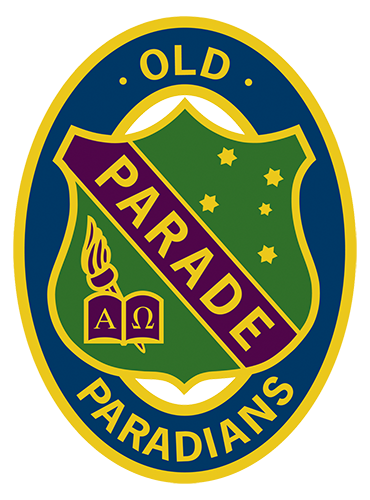

An Old Paradians’ Association medallion thought to have been cast almost 100 years ago has been donated to the College archive.
The generous donor is Neville Benedict, a final year Parade student in the wartime year of 1944, who handed the item over this week.
The medallion is thought to have been presented to his maternal uncle Francis William (‘Frank’) Frawley at the time he served as Secretary of the Old Paradians’ Association under the Presidency of Cecil Cantwell back in 1920.

Born on June 11, 1888, Frank is known to have attended CBC East Melbourne in the late 1890s, with his younger brothers Leo and Joseph following in the early 1900s. Neville remembered that the Frawley family home was situated within walking distance of the Old Bluestone Pile on the corner of Victoria and Johnston Streets – “a pretty substantial building that’s still there”.
Having completed his studies at Melbourne University (during which time he also trained as a military cadet), Frank, then employed as a railway official, enlisted for wartime duty. It was May 1914, and Frank was 26 years old.
Frank enlisted with the AIF’s 24th Battalion and on his appointment as captain in May 1915 disembarked the Euripides in Alexandria en route to Marseilles. That year, The Paradian acknowledged Frawley and his like in an article headlined Old Paradians on Active Service which in part read as follows;
“This year will ever be remembered in the annals of the College with a mixture of pride and sorrow – sorrow for the thousands who are daily perishing, and pride in the knowledge that many of the Old Parade boys have heard the Empire’s call. There are over one hundred Old Boys now in the firing line.”
Though the 24th took part in its first major offensive around Pozieres and Mouquet Farm in July and august 1917, Frank’s active wartime service had already been curtailed due to a bacterial infection.
In January 1917, Frank was admitted to the 7th Stationary Hospital in England with illness, and after another brief foray in France returned to England to fulfil administrative duties.
During this period, the auld alma mater wasn’t far from Frank’s thoughts. As The Paradian of 1917 reported;
“(Frank) writes breezily and often from the firing line. He has passed unscathed through the terrible campaigns of Gallipoli and France, and his latest letter received was written on the eve of departure for a three weeks’ trip to the land of his forefathers. His letters from Ireland are awaited with interest.”
By late 1919, not long after his discharge, Frank was back in Australia. The following year he accepted the role of Old Paradians’ Association secretary.
Neville remembered that his uncle later pursued a career in the public service, and rose to become the State Accommodations Officer, a precursor to the Director of Housing.
“It was just after the war when they were housing people in old army huts as they did later at Camp Pell,” Neville said.
“I know that Frank was back in uniform through the Second World War also, and at one stage was the Officer in Charge of the barracks at Caulfield Racecourse when the Australians were based at Caulfield and the Americans at the MCG.”
Now 88, Neville remembered his uncle as “a fine bloke” and thought it important that his memory was perpetuated at the College by way of the medallion.
“The medallion has been sitting quietly about the place for years, but we’ve just had a big clean-up at home and I thought the College might be grateful for it,” Neville said.
“Frank was my maternal uncle and as far as I know I’m the last survivor. All my family members are dead and they include my older brothers Kevin and Leo who also went to Parade.”